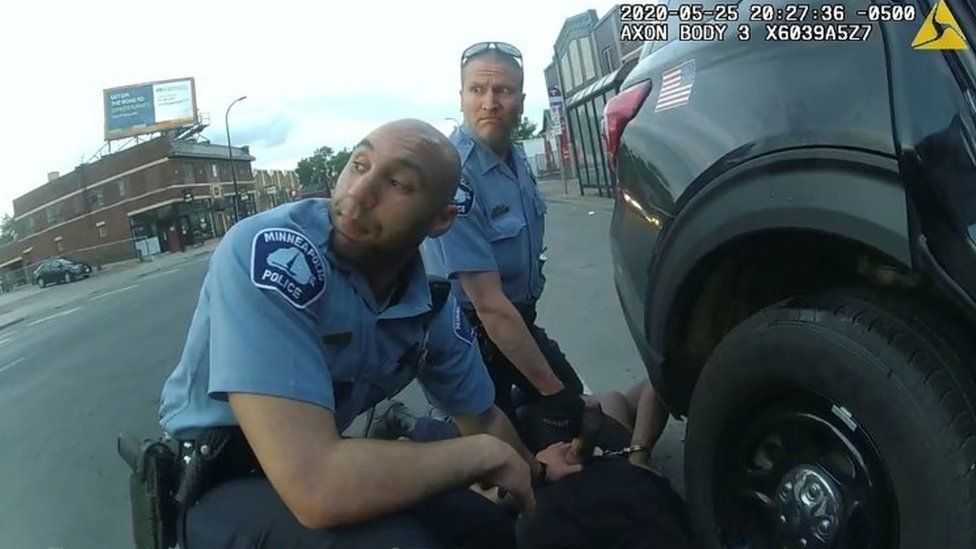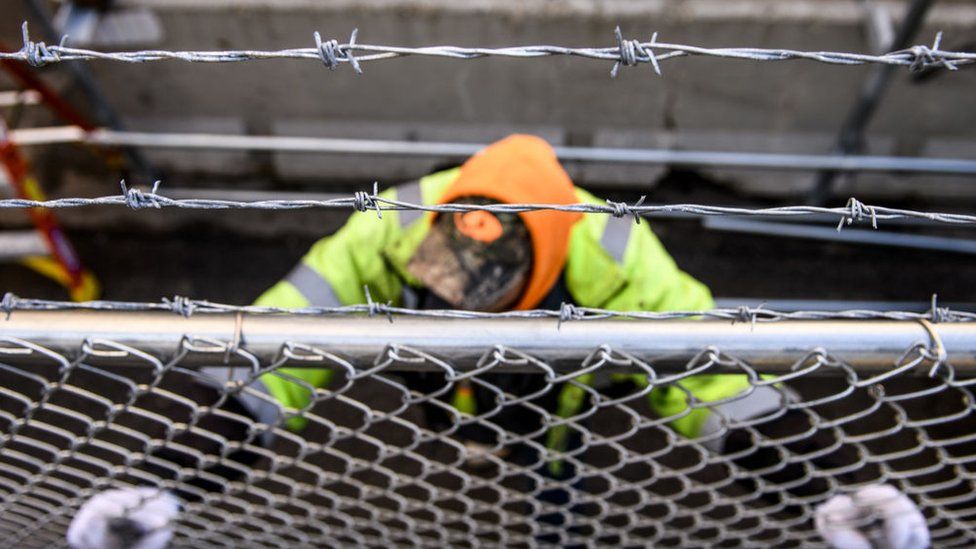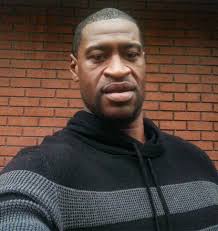It was video footage seen across the world – Derek Chauvin with his knee pressed on the neck of George Floyd for about nine minutes before he died.
Now the former US police officer faces trial on second-degree murder and second-degree manslaughter charges.
Three other dismissed officers will stand trial together later this year but proceedings in Chauvin’s trial will start Monday, when jury selection begins.
How will the jury be picked?
A pool of eligible local citizens have been called to appear by Hennepin County in Minnesota. From them, a jury of 12 and four alternates will be selected.
Potential jurors will be questioned to determine if they’ll be able to judge Derek Chauvin fairly. Each will have already received a 16-page questionnaire asking about their familiarity with the case, their news habits and their own interactions with law enforcement.
It includes direct questions about how many times they saw the video of George Floyd’s death and if they participated in, or had property damaged during, the subsequent protests.
Starting Monday, four potential jurors will appear each morning and afternoon to be individually questioned to assess their suitability.

The prosecution and defence can both ask Judge Peter Cahill to dismiss a potential juror “for cause” if they perceive a bias or conflict under questioning.
They can also use a limited amount of “peremptory challenges” to strike that person from the pool without giving a reason – the prosecution has nine of these and Chauvin’s defence team 15.
If either side suspects someone has been discriminated against because of something like sex or race – their dismissal can be objected to.
Once 16 people have been approved, the jury can be seated. This process may take weeks and we already know the trial itself will not begin until 29 March.
How is this process different to the UK?
The right to trial by jury is guaranteed in the US constitution. In England and Wales, jury trials are less common.
Jurors in the UK are picked at random from a pool and don’t know which trial they will serve on until they’ve been sworn in to help avoid pre-judgement. There are also much stricter reporting restrictions in place in the UK press to ensure suspects receive a fair trial.
 IMAGE COPYRIGHTGETTY IMAGES
IMAGE COPYRIGHTGETTY IMAGESEligible candidates are not subjected to cross-examination and can only dismissed by a judge in very specific circumstances, like if they know a victim. In theory it would be possible to have a panel of all-male or female jurors randomly selected.
The US vetting system has greater emphasis on ensuring a cross-section of society is represented. In cases involving issues like racism, the selection process can be seen as hugely important to the outcome of the trial and how fair it is perceived.
High-stakes US jury trials will more than likely involve special consultants who help lawyers research and select jurors to try and get a favourable outcome. Factors like the jurors’ backgrounds and their body language may even be considered within their trial strategy.
Jurors will be partially sequestered, or isolated, during Chauvin’s trial and fully sequestered once deliberation starts. They will also remain anonymous until the judge allows their identities to be made public.
It’s not uncommon for US jurors to speak out about their deliberations afterwards and in some infamous examples like the OJ Simpson trial, some have even gone on to write books about their experiences.
What are the challenges with picking the jury?
George Floyd’s death inspired weeks of protests against racial injustice in cities across the world.
The trial will be watched closely and local officials have fortified security around the courthouse and other government buildings ahead of the trial.
Given the extent of graphic evidence in the public eye, Chauvin’s trial is considered a real test for a US justice system which faces consistent accusations of racial basis and leniency toward law enforcement.
It’ll be highly unlikely that potential jurors will be coming in without any prior knowledge of Floyd’s death and each has been asked if they can put previous perceptions aside to decide in a fair and impartial manner.
Professor Valerie Hans, a jury researcher based at Cornell Law School, says the pre-trial questionnaire in this case is more detailed and personal than most.
While in other cases lawyers may only know basics like marital status and occupational information – she says potential jurors in the Chauvin cased are being asked their “deepest attitudes about some of the most important political and social topics of the day”.
One example she points to is them being asked about how favourable they view causes like Black Lives Matter and Blue Lives Matter. She says knowing these attitudes may be even better indicators than demographic characteristics, like gender and age, in predicting how a jury will view evidence.
“I think what each side is hoping to get out of the questionnaire, is a sense of whether or not a prospective juror will be open to the kinds of arguments that they intend to make over the course of the trial,” she says.
Will race be a factor in jury selection?
Patterns of extreme responses to the questions will provide opportunity for both sides to raise objections on the basis of fairness.
“Each side, if people are filling out this questionnaire completely, will have a sense going in about who they think would be a relatively favourable juror for them and perhaps not so favourable that the other side would want to strike them.”
Despite a body of law affirming that peremptory challenges on the basis of race are unconstitutional, Prof Hans says the judge will need to keep a close eye on patterns emerging with dismissals.
“I think because attitudes about the police do differ by race. And so many of the jury selection questions involve views and perceptions about the fairness of the police – it’s inescapable,” she says, when asked if race could become a factor in selection.
BBC.COM
 Home Of Ghana News Ghana News, Entertainment And More
Home Of Ghana News Ghana News, Entertainment And More





